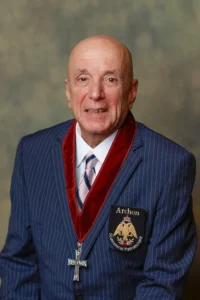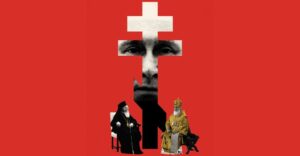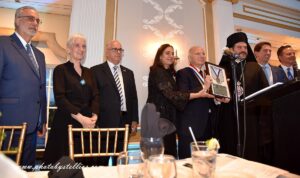Edict of Milan
Opening introductions
His Eminence Metropolitan Emmanuel of France
17 May 2013
Your Holiness,
Your Eminence Cardinal Péter Erdö,
Chief Rabbi Haleva
Your Eminences
Your Excellencies,
Representatives of the Autocephalous Orthodox Churches
Local Religious Communities
Members of the Diplomatic and Consular Court
Dear Speakers
Dear Friends
Ladies and Gentleman,
To celebrate a jubilee is like celebrating an anniversary. We take the time to return to the events of the past, in order to better consider our present, and to consider the situation itself, as well as the directions we may identify for our future.
We are here to commemorate the Edict of Milan which is celebrating its 1,700th jubilee or anniversary this year. Its tenets are as relevant today as they were then.
Let us first take a closer look at the position of the Edict of Milan, not only in the history of Christianity, but in human history in general.
When he co-issued the Edict, St. Constantine the Great was a pagan ruler. The same hand that signed this freedom of religion mandate into law, had also signed orders carrying out executions and persecutions. Yet, somehow he had a change of heart.
This reality causes us to have hope for peace in the world because the personal and institutional religious inclinations of rulers do not necessarily dictate their ability to act on behalf of the minority religions under their jurisdiction.
Let me read something to you that I came across recently:
“. . . for the sake of the peace of our times, that each one may have the free opportunity to worship as he pleases . . .” (Edict of Milan, §1).
This quote could have been printed in this morning’s newspaper, yet it is taken from the English translation of the Edict of Milan in the year 313.
Let us consider the larger text of the Edict for a moment:
When I, Constantine Augustus, as well as I, Licinius Augustus, fortunately met near Mediolanurn (Milan), and were considering everything that pertained to the public welfare and security, we thought, among other things which we saw would be for the good of many, those regulations pertaining to the reverence of the Divinity ought certainly to be made first, so that we might grant to the Christians and others full authority to observe that religion which each preferred; whence any Divinity whatsoever in the seat of the heavens may be propitious and kindly disposed to us and all who are placed under our rule (Edict of Milan, 313, § 1).
The simple framework of the opening premise of this edict is something we can still build upon today.
First, our motivation can be derived from concern for public welfare and security. Can we imagine a world where people of minority religions can live in peace and security? Freedom of religion is the fundamental right of every living person.
A second lesson is the emperors came together, face-to-face, to discuss how to improve the human condition with the power and authority each possessed. Dialogue will remain an integral part of all progress related to religious freedom.
Upon further examination, these men worked within their political realms to enact standards that ensured freedom of conscience to those whose image of a deity were very different. Each signatory to the Edict of Milan had a vision of a better future–one where all could be blessed by living in harmony with the other.
It is my hope that this meeting will move us further down the road toward peace. We can learn from each other and our past in order to avoid further injury to the human spirit that lives in each of us.
The pathway has never been easy and there have always been advances and set-backs. However, here we are, 1,700 years later, and we still have the hope of Milan in our hearts.
May all who leave this place after this conference carry this message with them wherever they travel.
We want to express sincere appreciation for those who assisted with the conference this weekend:
Thanks to CCEE for their cooperation in organising this meeting, and to Cardinal Erdo for embracing and supporting the work here;
The Support of the Order of St. Andrew the Apostle, Archons of the Ecumenical Patriarchate made this conference possible and we are deeply grateful;
Thanks to the speakers for their scholarship and willingness to share their thoughts in this venue.
We are in the very city where St. Constantine ruled after agreeing with Licinius to grant religious freedom. 1700 years later, we have in our midst another servant who also works tirelessly in promoting and advocating for freedom of religion from this historic city.
His All Holiness Ecumenical Patriarch Bartholomew I embraces the foundational principles of the Edict of Milan, not only for the Christian, but for the Muslim, the Jew, the Hindu, and all who choose their own religious expression in good conscience.
In addition to fighting for religious freedom, His All Holiness pursues peace, having declared 2013 the Year of Global Solidarity. He encourages every member of the human race to stand with those who are poor, oppressed, and in need of an advocate. This conference is the result of his vision and serves as one plank in the bridge toward peace.
Meeting together here is also a part of the Ecumenical Patriarch’s ministry of dialogue. Through meeting and talking together face-to-face, His All Holiness hopes to promote greater love and understanding for ‘the other’.
The sooner we are at peace with one another, the sooner we can more effectively be the stewards of the earth we are called to be. The issues facing the globe today will require a united effort to reduce wasteful use of our precious natural resources, restore health, and remove the threat of nuclear devastation.
The challenges facing humanity today are daunting. We must come together and build that bridge to peace one plank at a time until we have risen above the flood waters of intolerance and insensitivity to people and the planet.
As His All Holiness stands to welcome you to this important series of meetings, let us commit to listen to one another, work cooperatively, and keep the spirit of the Edict of Milan alive for the next generation.
Your All Holiness…







